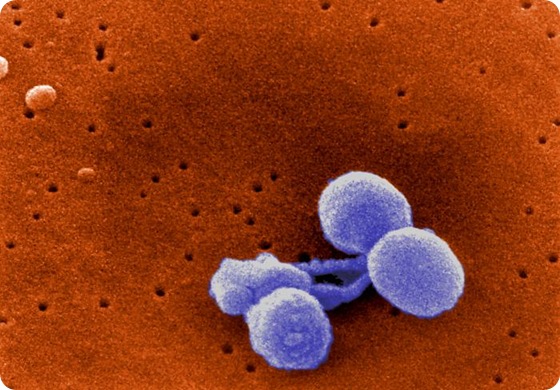Pneumonia is an acute respiratory infection of the lungs. In patients with pneumonia, the alveolar sacs of the lungs become inflamed and fill with fluid or pus. The pneumonia infection can occur in a single lobe of one lung (lobar pneumonia), or it can affect both lungs (bronchial pneumonia).
Since the alveolar sacs are responsible for oxygen exchange, buildup of fluid or pus within these structures can prevent proper filling with air and lead of inefficient levels of oxygen reaching the blood. Because of this, pneumonia can be particularly dangerous in children under age 2, adults over age 65, people with a weakened immune system, or those with chronic lung diseases such as COPD and asthma.

Scanning Electron Micrograph of Streptococcus pneumoniae
Worldwide, pneumonia infection is the leading cause of death in children under age 5 and resulted in 935,000 deaths in children in 2013. In the United States, pneumonia is responsible for over 1 million hospitalizations per year.
Symptoms
Pneumonia can be caused by a variety of organisms, including several types of bacteria, viruses, fungi, or mycoplasma, which is a bacteria-like organism. Depending on the causative agent, the symptoms of pneumonia can be mild or severe.
The most common symptom in patients with pneumonia is coughing, often accompanied by the presence of green, yellow, or bloody mucous or sharp chest pain. Patients with pneumonia also experience fevers, nausea, diarrhea, loss of appetite, fatigue, and shortness of breath—the severity of which can vary depending on the causative agent and the patient’s overall level of health.
In bacterial-based pneumonia, a very high fever is often accompanied by sweating, chills, and occasionally a sense of delirium or confusion in the patient. Viral-based pneumonia often causes flu-like symptoms, namely fever, chills, muscle aches, and headaches. In fact, pneumonia infection is a common complication of the flu or other respiratory infections.
Pneumonia is spread through the airborne droplets that are dispersed by coughing or sneezing. It can also be spread through contamination of the blood.
Most forms of pneumonia are highly treatable with antibiotics, fluids, fever-reducing medications, and cough suppressants. However, failure to properly or efficiently treat pneumonia can lead to several complications, including bacteremia (bacterial infection of the blood), lung abscess, pleural effusion (infection and fluid buildup in the pleural space between the outer lining of the lung and the inner lining of the chest cavity), and labored breathing. These complications are serious and typically require the patient to be hospitalized.
Risk Factors
There are several risk factors that increase a person’s chance of acquiring a pneumonia infection. Smoking can irritate the lining of the lungs and lower immune responses to invading lung pathogens.
Patients with weakened immune systems, such as those with HIV infections, organ transplant recipients, or those receiving chemotherapy treatment, are also at greater risk of infection.
Certain chronic disease conditions can also increase risk of pneumonia. These include lung diseases such as COPD and asthma, heart disease, diabetes, liver disease, and cystic fibrosis.
Additional risk factors include living in a nursing home, undergoing recent surgery, or requiring the sustained use of a ventilator. In children, malnutrition, indoor pollution, overcrowded living quarters, and pre-existing illnesses such as measles or HIV infection can increase the risk of developing pneumonia.
Sources
- http://www.mayoclinic.org/diseases-conditions/pneumonia/basics/definition/con-20020032
- http://www.lung.org/lung-health-and-diseases/lung-disease-lookup/pneumonia/
- http://www.nlm.nih.gov/medlineplus/ency/article/000145.htm
- http://www.nhlbi.nih.gov/health/health-topics/topics/pnu/
- http://www.cdc.gov/pneumonia/
- https://www.who.int/
- https://www.asthmaandlung.org.uk/
Further Reading
Last Updated: Aug 22, 2023